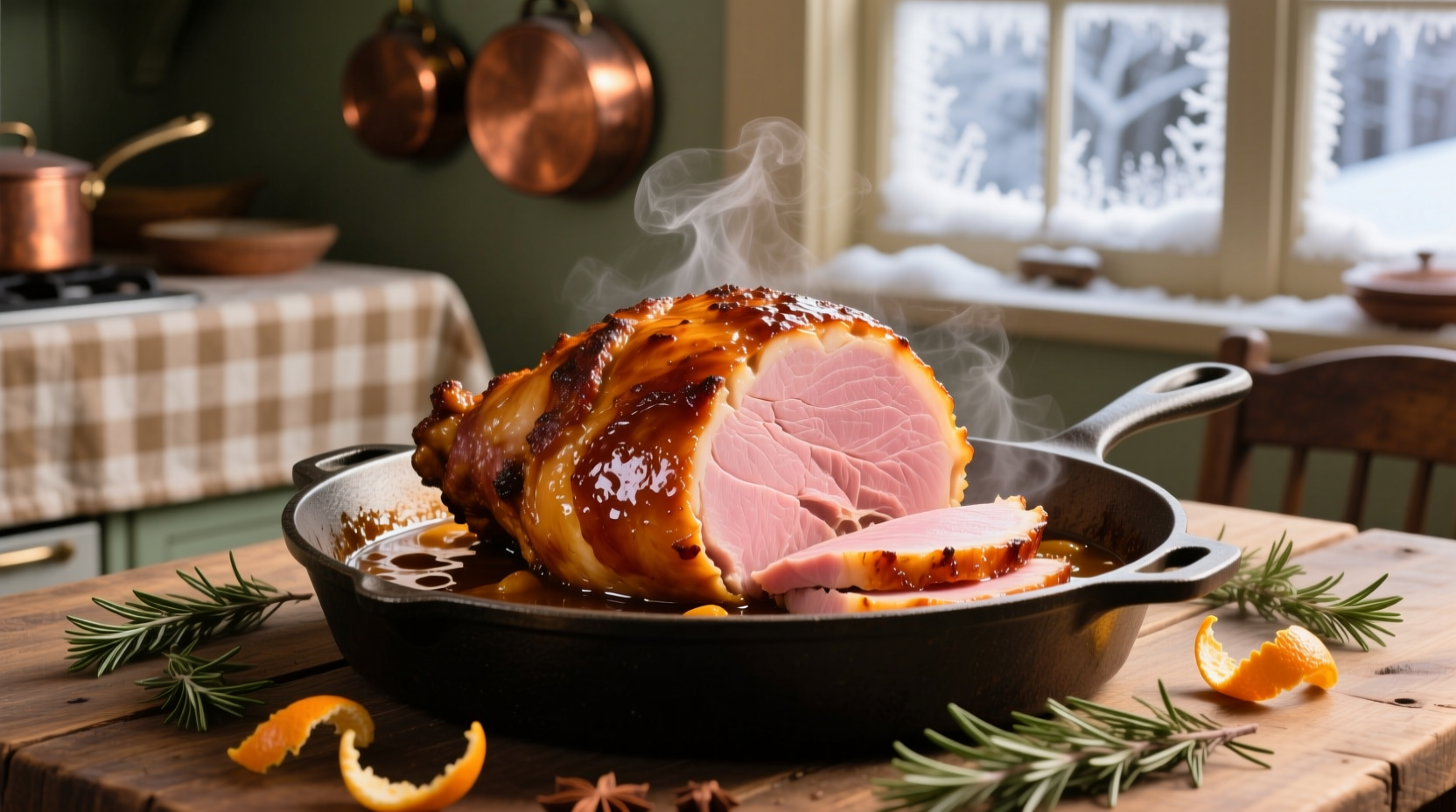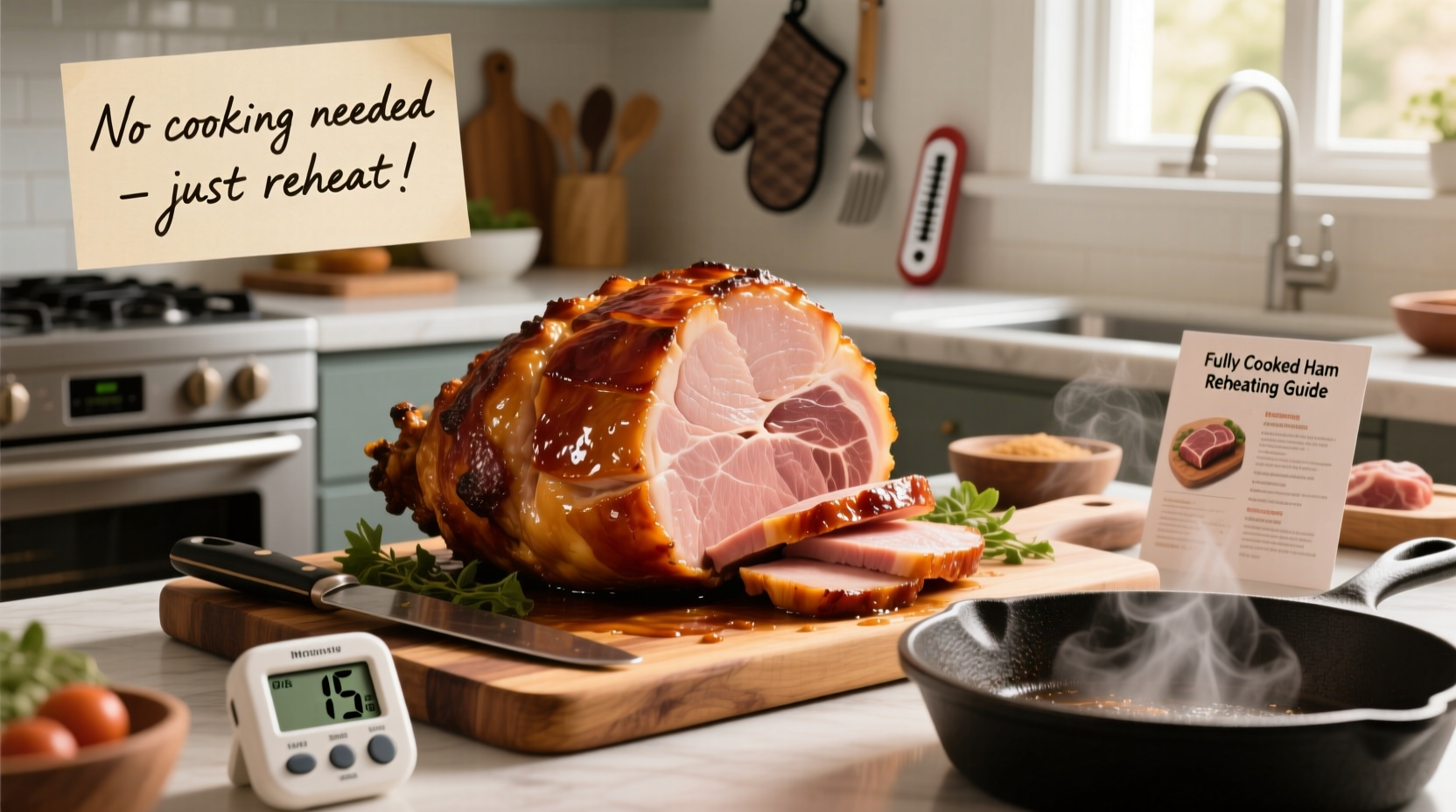When you're holding a fully cooked ham in your kitchen, you might be confused about whether it needs "cooking" or just reheating. The good news is that fully cooked hams have already been cured, smoked, or baked during processing, so your job is simply to warm it through while maintaining moisture and adding flavor. Getting this right ensures a tender, juicy centerpiece for your meal without the risk of dry, tough meat.
Understanding Fully Cooked Ham: What It Really Means
The term "fully cooked" on ham packaging indicates the meat has reached a safe internal temperature during processing. According to the USDA Food Safety and Inspection Service, fully cooked hams have been heated to at least 147°F during production, making them safe to eat right from the package. However, for optimal flavor and texture, reheating is recommended.
Many home cooks mistakenly treat fully cooked ham like raw meat, leading to overcooked, dry results. The key difference: you're not cooking it to doneness—you're reheating it to serving temperature. This subtle distinction affects both cooking time and temperature.
Preparation Steps Before Reheating
Proper preparation sets the stage for perfect results. Follow these steps before your fully cooked ham hits the oven:
- Thaw completely if frozen (allow 4-5 hours per pound in refrigerator)
- Remove packaging and rinse surface under cool water
- Pat dry with paper towels to help glaze adhere
- Score the surface in a diamond pattern (about 1/4 inch deep)
- Place on rack in roasting pan with cut side down
- Add liquid (1/2 cup water, broth, or apple juice) to bottom of pan
For spiral-cut hams, skip scoring and wrap the entire ham in foil during reheating to prevent the slices from drying out. These pre-sliced hams require slightly less reheating time than whole hams.
Perfect Reheating Method: Time, Temperature & Technique
The ideal reheating process balances thorough warming with moisture retention. Here's the professional approach:
- Preheat oven to 325°F (never exceed 350°F)
- Place ham in roasting pan with added liquid
- Cover tightly with aluminum foil
- Heat for 10-15 minutes per pound
- Insert meat thermometer into thickest part (avoiding bone)
- Remove when internal temperature reaches 140°F
- Uncover, apply glaze, and return to oven for final 10-15 minutes
This low-and-slow method preserves moisture while bringing the ham to a food-safe serving temperature. The USDA recommends 140°F as the minimum safe temperature for reheated fully cooked meats.
| Ham Weight | Reheating Time at 325°F | Reheating Time at 350°F |
|---|---|---|
| 5-7 lbs (shank or butt portion) | 50-105 minutes | 40-90 minutes |
| 8-10 lbs (whole ham) | 80-150 minutes | 70-125 minutes |
| Spiral-cut ham | 10-12 minutes per pound | 8-10 minutes per pound |
Note: These times are estimates. Always verify with a meat thermometer rather than relying solely on time calculations.
Timing Your Glaze Application Perfectly
One of the most common mistakes when reheating fully cooked ham is applying the glaze too early. Sugary glazes will burn if added during the entire reheating process. For best results:
- Apply glaze during the last 20-30 minutes of reheating
- Remove foil before glazing to allow caramelization
- Brush on thin, even layers every 10 minutes
- Watch carefully to prevent burning (sugars caramelize quickly above 325°F)
Popular glaze combinations include brown sugar with Dijon mustard, honey with cloves, or maple syrup with pineapple juice. For spiral-cut hams, pour about half the glaze into the bottom of the pan and brush the rest over the top before the final uncovered heating stage.
Common Mistakes That Ruin Fully Cooked Ham
Based on analysis of home cooking forums and culinary expert feedback, these errors account for most disappointing ham results:
- Overheating - Cooking above 350°F or beyond 140°F internal temperature
- Insufficient moisture - Not adding liquid to the pan or failing to cover with foil
- Ignoring thermometer readings - Relying solely on time calculations
- Glazing too early - Applying sweet glazes at the beginning of reheating
- Cutting immediately - Slicing before the 10-15 minute resting period
Professional chefs emphasize that fully cooked ham is essentially being reintroduced to heat, not cooked for the first time. This mindset shift prevents the most common errors that lead to dry, tough results.
Serving and Storage Guidelines
After removing your ham from the oven, allow it to rest for 10-15 minutes before slicing. This resting period lets the juices redistribute throughout the meat. When carving:
- Cut against the grain for maximum tenderness
- Use a sharp carving knife with smooth slicing motions
- For spiral-cut hams, simply separate the pre-cut slices
Store leftovers in airtight containers in the refrigerator for 3-4 days. For longer storage, wrap tightly in freezer paper and freeze for up to 2 months. When reheating leftovers, use a microwave on 50% power or warm in a covered dish with a splash of liquid in the oven at 325°F until heated through.

When Special Circumstances Require Different Approaches
While the standard reheating method works for most fully cooked hams, certain situations require adjustments:
- City hams (wet-cured): More delicate; reduce reheating time by 20%
- Country hams (dry-cured): Require soaking before reheating
- Pre-glazed hams: May need less additional glaze application
- Smoked turkey ham: Cook to 165°F internal temperature
Always check your specific ham's packaging for manufacturer recommendations, as processing methods can vary between brands. The National Pork Board confirms that most commercial hams follow similar processing standards, but specialty products may have unique requirements.
Frequently Asked Questions
Can I eat fully cooked ham without reheating it?
Yes, fully cooked ham is safe to eat cold straight from the package. However, reheating enhances flavor and texture. If serving cold, keep it refrigerated until ready to serve and consume within 3-5 days.
Why does my fully cooked ham always turn out dry?
Dry ham typically results from overheating or insufficient moisture. Common causes include cooking above 350°F, not covering with foil, skipping the added liquid in the pan, or exceeding the recommended 10-15 minutes per pound guideline. Always use a meat thermometer and remove at 140°F internal temperature.
How long can I keep a reheated fully cooked ham in the refrigerator?
Reheated fully cooked ham remains safe to eat for 3-4 days when stored in airtight containers in the refrigerator below 40°F. For longer storage, freeze within 2 hours of reheating and consume within 1-2 months for best quality.
Should I cover the ham with foil while reheating?
Yes, covering with foil during the main reheating phase prevents excessive moisture loss. Remove the foil during the final 20-30 minutes when applying glaze to allow proper caramelization. For spiral-cut hams, keep foil on throughout reheating to prevent the slices from drying out.











 浙公网安备
33010002000092号
浙公网安备
33010002000092号 浙B2-20120091-4
浙B2-20120091-4